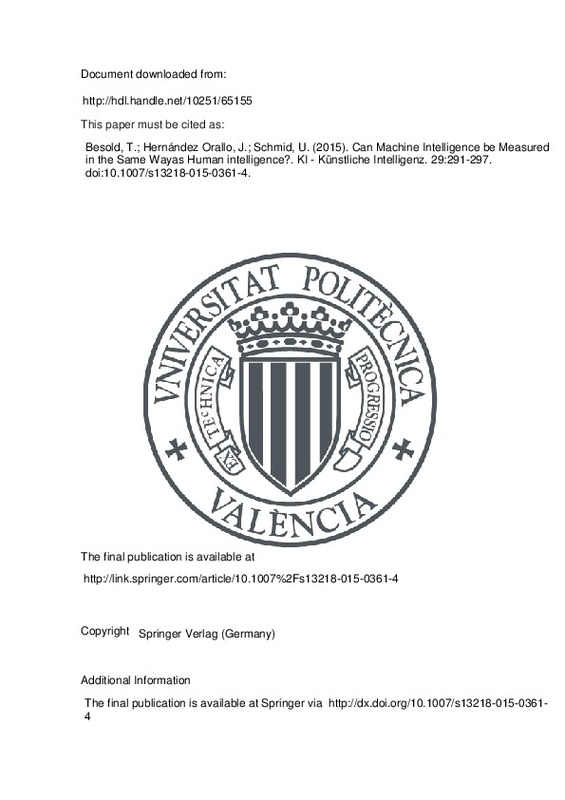Amthauer R, Brocke B, Liepmann D, Beauducel A (1999) Intelligenz-Struktur-Test 2000 (I-S-T 2000). Hogrefe, Göttingen
Bartholomew DJ (2004) Measuring intelligence: facts and fallacies. Cambridge University Press, Cambridge
Besold TR (2013a) Human-level artificial intelligence must be a science. In: Kühnberger K-U, Rudolph S, Wang P (eds) Artificial general intelligence, vol 7999 LNCS. Springer, Berlin, pp 174–177
[+]
Amthauer R, Brocke B, Liepmann D, Beauducel A (1999) Intelligenz-Struktur-Test 2000 (I-S-T 2000). Hogrefe, Göttingen
Bartholomew DJ (2004) Measuring intelligence: facts and fallacies. Cambridge University Press, Cambridge
Besold TR (2013a) Human-level artificial intelligence must be a science. In: Kühnberger K-U, Rudolph S, Wang P (eds) Artificial general intelligence, vol 7999 LNCS. Springer, Berlin, pp 174–177
Besold TR (2013b) Turing revisited: a cognitively-inspired decomposition. In: Müller VC (ed) Philosophy and theory of artificial intelligence, SAPERE 5. Springer, Berlin, pp 121–132
Besold TR (2014) A note on chances and limitations of psychometric AI. In KI 2014: Advances in artificial intelligence. Springer, Berlin, pp 49–54
Bors DA, Vigneau F (2001) The effect of practice on raven’s advanced progressive matrices. Learn Individ Differ 13(4):291–312
Bringsjord S (2011) Psychometric artificial intelligence. J Exp Theor Artif Intell 23(3):271–277
Bringsjord S, Schimanski B (2003) What is artificial intelligence? Psychometric AI as an answer. In: Proceedings of the 18th international joint conference on artificial intelligence (IJCAI’03), Morgan Kaufmann, pp 887–893
Burghardt J (2005) E-generalization using grammars. Artif Intell 165:1–35
Cooper R, Fox J, Farringdon J, Shallice T (1996) A systematic methodology for cognitive modelling. Artif Intell 83:3–44
Deary IJ, Der G, Ford G (2001) Reaction times and intelligence differences: a population-based cohort study. Intelligence 29(5):389–399
Detterman D (2011) A challenge to Watson. Intelligence 39(2–3):77–78
Dowe DL, Hernández-Orallo J (2012) IQ tests are not for machines, yet. Intelligence 40(2):77–81
Harnad S (1990) The symbol grounding problem. Physica D 42:335–346
Hernández-Orallo J (2000) Beyond the Turing test. J Log Lang Inf 9(4):447–466
Hernández-Orallo J, Dowe DL, Hernández-Lloreda MV (2014) Universal psychometrics: measuring cognitive abilities in the machine kingdom. Cogn Syst Res 27:50–74
Hofmann J, Kitzelmann E, Schmid U (2014) Applying inductive program synthesis to induction of number series a case study with IGOR2. In KI 2014: Advances in artificial intelligence, Springer, Berlin, pp 25–36
Johnson-Laird PN (1988) The computer and the mind: an introduction to cognitive science. Fontana Press, London
Kühnberger KU, Hitzler P (2009) Facets of artificial general intelligence. KI 23(2):58–59
Legg S, Hutter M (2007) Universal intelligence: a definition of machine intelligence. Minds Mach 17(4):391–444
Lovett A, Forbus K, Usher J (2010) A structure-mapping model of Raven’s Progressive Matrices. In: Proceedings of CogSci-10, pp 2761–2766
Miller M (1999) The savant syndrome: intellectual impairment and exceptional skill. Psychol Bull 125(1):31–46
Mueller ST, Jones M, Minnery BS, Hiland JMH (2007) The BICA cognitive decathlon: a test suite for biologically-inspired cognitive agents. In: Proceedings of behavior representation in modeling and simulation conference, Norfolk
Newell A (1980) Physical symbol systems. Cogn Sci 4:135–183
Newell A (1982) The knowledge level. Artif Intell 18:87–127
Pylyshyn Z (1980) Computation and cognition: issues in the foundation of cognitive science. Behav Brain Sci 3:111–132
Sanghi P, Dowe DL (2003) A computer program capable of passing I.Q. tests. In: Slezak PP (ed) Proceedings of ICCS/ASCS-2003, Sydney, AU, pp 570–575
Siebers M, Schmid U (2012) Semi-analytic natural number series induction. In KI 2012: Advances in artificial intelligence, Springer, Berlin, pp 249–252
Spearman C (1904) General intelligence objectively determined and measured. Am J Psychol 15:201293
Sternberg RJ (ed) (2000) Handbook of intelligence. Cambridge University Press, Cambridge
Strannegård C, Amirghasemi M, Ulfsbäcker S (2013a) An anthropomorphic method for number sequence problems. Cogn Syst Res 22–23:27–34
Strannegård C, Cirillo S, Ström V (2013b) An anthropomorphic method for progressive matrix problems. Cogn Syst Res 22–23:35–46
Turing AM (1950) Computing machinery and intelligence. Mind 59:433–460
Turing AM (1969) Intelligent machinery. In: Meltzer B, Michie D (eds) Machine intelligence, vol 5. Edinburgh University Press, Edinburgh, pp 3–23
Von Ahn L, Blum M, Hopper NJ, Langford J (2003) CAPTCHA: using hard AI problems for security. In: Advances in cryptology—EUROCRYPT 2003, Springer, pp 294–311
Wechsler D (1944) The measurement of adult intelligence. Williams & Wilkins, Baltimore
[-]







![[Cerrado]](/themes/UPV/images/candado.png)


